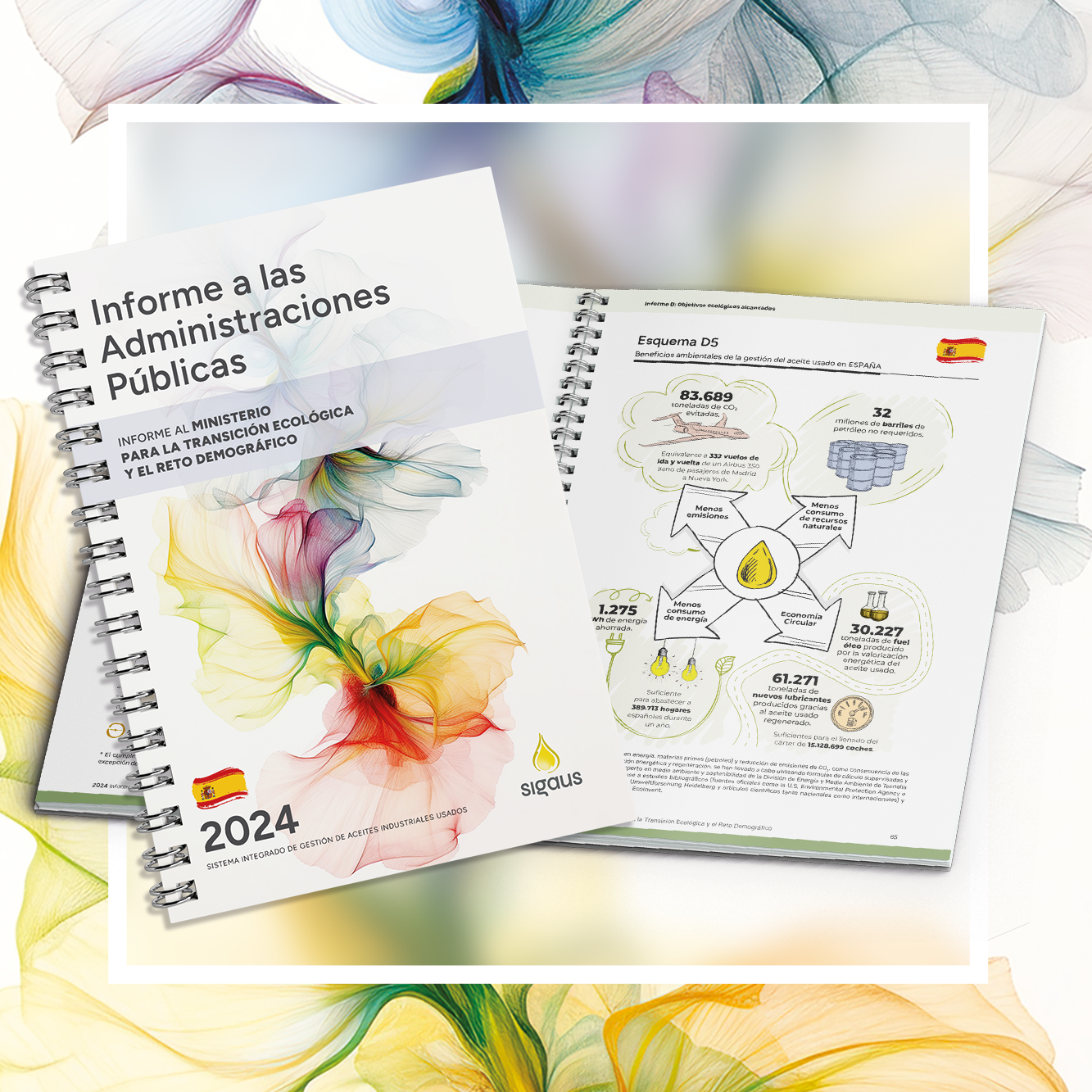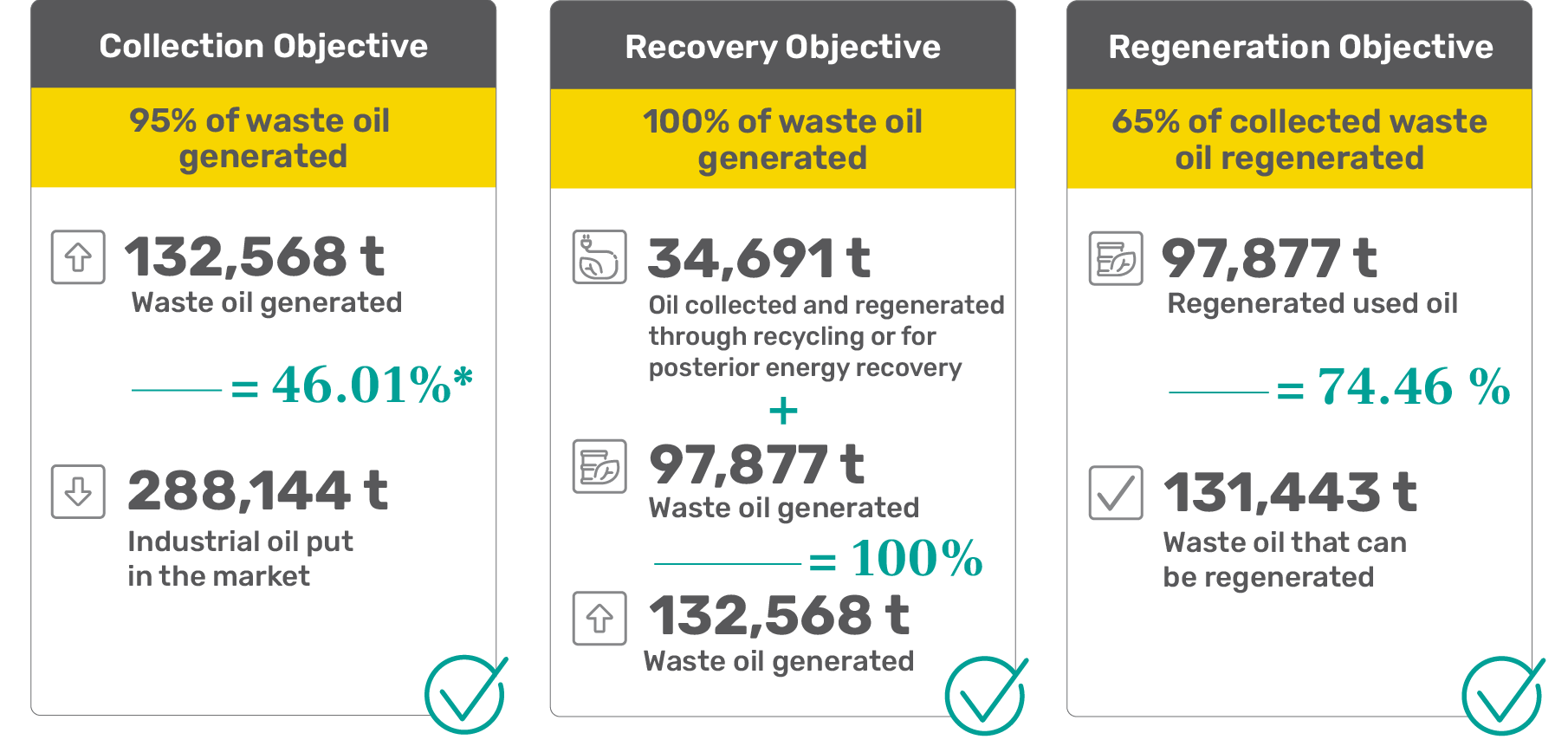49. Cabecera noticia Informes 2024
SIGAUS managed more than 133,000 tonnes of industrial waste oil in 2024
According to official reports submitted by SIGAUS to the Ministry for Ecological Transition and Demographic Challenge (MITECO) and the relevant Spanish autonomous regional authorities, 132,568 net tonnes of waste oil were managed and fully reused as new resources in 2024: 74% was turned into regenerated bases for new lubricants, while the remaining 26% was allocated to energy recovery, converting the waste into an alternative industrial fuel.
06-05-2025

24. Parrafo noticia Informes Oficiales 2024
Last year, SIGAUS member companies sold 288,144 tonnes of industrial oils, a volume similar to that of 2023, with slight growth of 0.2%. By sector, over half of the oil (57%) was intended for the automotive industry, and 41% for industrial use. By origin, 69% was produced domestically, with the remaining 31% imported.
Waste oil, meanwhile, was collected from 66,500 producer establishments in 4,800 Spanish municipalities, including high levels of activity in rural (3,400 municipalities served), mountainous (1,400), and sparsely populated areas (1,800).
To serve these points, SIGAUS counted on a network of 164 companies and 203 facilities that cover the different phases of waste management, from collection to transportation, storage, pretreatment and final treatment. These companies carried out 178,000 collections, recovering 153,589 gross tonnes of waste oil, including 14% water and other impurities.
Regeneration of 98,000 tonnes of waste oil
After removing impurities, the resulting net volume of waste oil reached 132,568 tonnes, all of which was fully utilised through the available treatments, meeting the recovery targets set by regulations. Specifically, three quarters of the regenerative waste oils (nearly 98,000 tonnes) were transformed into regenerated bases, obtaining more than 61,000 tonnes of new lubricants, enough to fill the crankcases of 15 million vehicles.
32. Parrafo cita noticia Informes 2024
“
Through the regeneration of 98,000 tonnes of waste oils, over 61,000 tonnes of new lubricants were produced in 2024.
„
The waste oil that was not regenerated was energetically reused through a process that transforms it into an alternative to conventional fuel oil, called BIA, that is suitable for industrial use, mainly in cement kilns, paper mills and power generation plants. Around 30,000 tonnes of this low-sulphur fuel were generated thanks to this treatment.
SIGAUS’s management, based on circular economy principles, enabled significant savings of raw materials and energy, and prevented substantial greenhouse gas emissions. In total, emissions of more than 83,000 tonnes of CO₂ were avoided, as well as the consumption of 1,275 GWh of energy. All this is possible because producing lubricant base oils or fuel oil from waste oil requires less energy and generates fewer emissions than conventional processes based on crude oil refining, which also helps to reduce the consumption of a non-renewable raw material: up to 32 million barrels of oil would be required to produce the same products as obtained from managed waste oil.
24. Parrafo noticia Informes 2024 (II)

*A waste oil generation coefficient of over 40% guarantees that the recycling/ collection target will be met, as the authorities acknowledge that lubricant oil loses up to 60% of its volume when used.
Control and traceability
All information submitted by SIGAUS to the environmental authorities comes from its Technological Information System (TIS), which gathers data from companies marketing industrial oils in Spain and those managing waste oil, always based on official certificates. These data are enhanced with statistical variables and are integrated into a geographic information system (GIS), enabling exhaustive tracking of waste management from origin to final destination.
Eduardo de Lecea, General Manager of SIGAUS, notes: “Waste oil is a hazardous waste generated throughout the whole country and economy. Fortunately, it is also one of the most thoroughly and effectively controlled wastes. In 2024, we again met the legal targets for collecting, reusing and regenerating waste oil, turning waste into a resource and transforming the problem into an opportunity. We have been doing it for 18 years. We also operate efficiently, reducing costs for our member companies and, ultimately, for consumers. Thanks to our commitment to technology, we now have a level of information and traceability that was unimaginable years ago, serving as a benchmark in our sector. We have information on more than 160,000 points that generate waste oil, and we control every movement of waste oil in our country. This information allows us to report to public authorities with the highest level of assurance, and to reassure both businesses and the public that waste oil does not harm the environment.
Supplementary reports
The Official Reports sent by SIGAUS also contain the Annual Monitoring and Control Report on Implementation of the Business Prevention Plan, which the organisation has been carrying out since 2010. In the last fiscal year, 153 companies reported implementing prevention measures, totalling 608 new actions across the seven established prevention lines in order to minimise the environmental impact of industrial oil.
The report also includes a specific section to review and control actions that verify the data provided by both member companies and authorised waste managers. It also includes a chapter on the Lubricants Market Study in Spain 2023, prepared by the independent consultancy firm PwC, which served as the basis for establishing SIGAUS's market share in 2024. The document concludes with a detailed analysis of communication activities undertaken by the organisation over the past year.